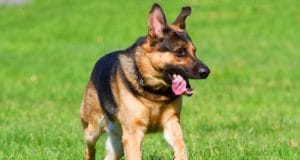Pretty much every Pack Leader has opened a door with their hand and then watched as their dog reached out her paw and attempted to do the same. Likewise, you’ve probably seen your dog watching other dogs, then jump in and engage in the same behavior.
Dogs, just like humans, are natural imitators. But why?
If you’ve been reading this site or watching Cesar for any length of time, you know that dogs are pack animals. Even though you’ve probably heard that a lot, you might not have thought about how it relates to the way dogs learn and behave.
As part of a pack, you have to fit into the group. You have to behave the way others around you behave. So how do dogs learn to do this?
By observing and imitating.
Two things are interesting about the way dogs imitate. The first is that they are one of the only creatures to do so across species. The second is that, like human infants, dogs aren’t just copycats — they only imitate behaviors that seem useful.
Human Do, Doggy Do?
There are a number of different creatures that imitate others within their own species. People imitate other people. Birds imitate other birds. Non-human primates like monkeys and apes imitate others in their group.
But dogs not only imitate other dogs — they copy what we do as well. What’s even crazier is that they have been known to do so even when the imitation doesn’t benefit them.
How so? In a study, dogs watched their human Pack Leader open a sliding door. Half of the people opened the door with their hand. The other half used their head. Some of the dogs were even rewarded for not imitating their owners. Despite the lure of a reward, all of the dogs were still more inclined to imitate whatever their pack leader did.
Why? Experts think that dogs’ tendency to copy us came about through thousands of years of selective breeding and training. Over time, it grew to become a built-in reaction.
“Walk this Way” — Not Quite
There’s a silly old visual gag about imitation where someone with a ridiculous walk tells the people following to “Walk this way,” and they match his specific gait completely.
From the above example, you might think that this is what dogs are like. That they would blindly follow every single one of our actions — even if they seemed to make no sense. This, however, is not the case.
What dogs do is far more complicated and clever. They observe what humans and other dogs are doing, evaluate whether or not that behavior will be useful for obtaining whatever goal they are after, and then decide whether or not to copy it based on that.
For example, there was a study done where dogs watched another dog who had been trained to get food using her paw rather than her mouth. She did this with a stick in her mouth for about half of the observing dogs. For the others, she had nothing in her mouth.
What happened? Those who watched her with a stick in her mouth stuck to using their mouths. Those who watched her with no stick used their paw.
Why? The implication seems to be that when she had the stick, they assumed that was why she wasn’t using her mouth, because obviously it would be more efficient. When she didn’t have the stick, the observing dogs assumed that she knew something they didn’t and that using their paws would be easier.
What This Imitating Means For You
Observe and repeat. That’s how dogs learn.
So for example if you’re trying to teach your dog to stand, it might not be a bad idea to get down on all fours before pushing yourself up. When teaching how to shake hands, it may help to actually put your hand out like you want to shake.
Basically, matching your body movements to whatever you’re trying to teach can help the learning process.











